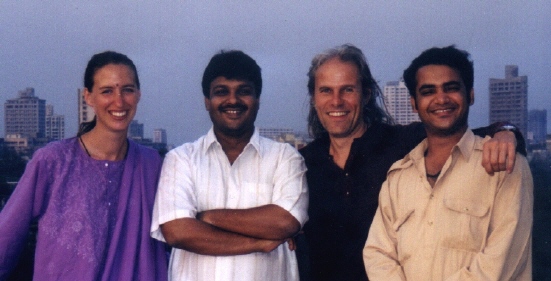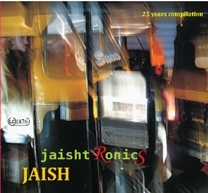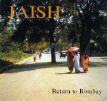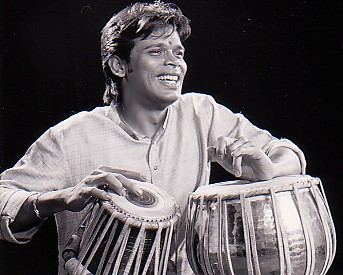JAISH

Sie finden den deutschen
Text weiter unten
the story of the pakhavaj press-releases
JAISH is
a swiss-indian cultural-exchange
India:

CD jaishtRonics, JAISH,
XOPF-Records
049 - ein süchtig-machender Surreal-Mix aus Wahn und Wirklichkeit
as double-cd together with Duo fatale, Fatalos
remix
online available now in
any shop like amazon
or rippletunes
or qobus
or itunes ...
The group / history
JOPO & Ingeborg Poffet,
two Avantgarde-musicians, who are international playing as Duo fatale, have
already went several times to Bombay during their Asia-travels. Here, in the
house of Shejwal, they studied the traditional north-indian hindustani-music
and the language of the pakhavaj.
In 1991 they founded the
group JAISH. The first year they still played and lived together
with Pt. Arjun Shejwal, one of the last great masters of
the pakhavaj, who died in 1992. To his son Prakash Shejwal he gave his love
to the music, tradition and deeply expressions. Like him Prakash is openminded
for influences and combinations with other rhythm-constellations, New Music
and Jazz.
At the end of the second
stay they documented their work as the trio JAISH (JOPO,
Ingeborg & Prakash) with a recording in Bombay, which is published as
music-cassette "mumbai-dance"
(XOPF-Records no. 18).

In '93 that trio JAISH
played at the 2. int. XOPF-Festival '93 in Basel, Switzerland, followed
by other concerts and a tour in april '94.
During their stay in Bombay
at the beginning of '96 they reformed the group to a quartet: with the
great
master of the sarangi Shri Anant Kunte, who has just done his newest solo-recording
for All India Radio. Born in 1930, he was a stuff member of All India
Radio
Bombay for more than 35 years. That's why he played with many very great
musicians as accompaniment. He uses to play with Prakash Shejwal for a
lot of recordings
since 8 years.

In january '98 tempel-concert
at the Gharana-Festival of Pakhavaj in Bombay with a great success. After
that they did a working progress on new compositions with the sitar-player
Atul Keskar with recordings in Pune.
In 1999 they worked out a
new program with the bansouri player Milind Sheorey, who is now the regular
fourth member of JAISH. They have made a home-recoring in Bombay to document
the new work.
In
2006 JOPO & Ingeborg Poffet have created
a new program for Jaish'n electronics, which they have recorded in Studio Platinum
JAISH is
available as a trio with Prakash Shejwal, JOPO & Ingeborg Poffet, the
heart of the group, since 1999 as a quartet with Milind Sheorey, bansouri,
, and since 2006 as a quintet with tabla (if he is available with Udai Mazumdar,
side-man of Ravi Shankar.)
Last
concerts in India:
on 15/16th
of january 2005 at Panse-Gharana-Festival of Pakhavaj in Bombay, India (Indian
Book and JAISH)
18. february 2005 in Belapur, New Bombay
1st of january 2006 at Panse-Gharana-Festival of Pakhavaj in Bombay, India
(Indian Book and JAISH)
Ingeborg Poffet started early to play several instruments
and to sing. She had the first concert at the age of four with the accordeon.
Later she played classical and contemporary concerts in orchestras and as
a free lancer. From '84-'86 she studied computer-music at the Musikhochschule
Cologne (Germany).>
JOPO & Ingeborg founded
the "Duo fatale" in
1989. In their exciting formation they got a symbiose of composition, interpretation
and improvisation. Living in Basel, Switzerland, they are both composers for
all their groups and for command works as for theatre and multi-media-performances.
They use to meet local musicians on their tours all over the world as in Turkey,
Russia, New York, Indonesia, Germany, Sudan and Egypt. With Duo fatale they
had concert-participations at int. festivals in Basel, Cheboksary, St. Petersburgh,
Vilnius, Riga, Tallinn, Pärnu, Minster, Sevilla Expo '92, Singapore, Grenoble,
Jakarta and Khartoum. Published releases with Duo fatale on XOPF-Records are
"Fatalos" CD (no.5), "Fatalos 2" CD (no.11) and "living
in Apollon's garden" from Duo fatale and the Duo fatale Orchestra CD
(no.23).
from Jabalpur (Madhya Pradesh) learned
the bansouri (bamboo-flute) by the guru late Pandit Prabharar Bagaddeo and
"Padmabhushan" Shrimati Annapurna Devi of Maihar Gharana. He was
awarded with the national scholarship for classical hindustani-music '93-'95.
He played with classical musicians as Ashwini Bhide, Pandit Birju Maharaj,
Ajay Pohankar and others. Also his musical work is settled in Bhajans, Ghazals
and Haveli sangeet as well as in film music and solo-concerts. Since 1987
he's working as a professional musician in Mumbai. He has worked with Prakash
Shelty in "Hard notes loose change", a fusion album 1994-95 for
the label "crescendo music". He did many recordings and releases
on different labels as a side-musician with concerts in abroad like Paris
and Amsterdam; his solo-concerts took part on festivals in Mumbai, Bangalore,
Hyderabad, Bhopal and Pune. Since 1994 he playes regulary with Prakash Shejwal
even for international concerts.
from Bombay learned pakhavaj from
his father and guru late Pandit Arjun Shejwal. In the music-competition for
percussion in Bombay he got the first prize in '76, and in '83 he received
the Gold Medal at the competition held by the All India Radio, and has now
established himself as an "A"-graded artist of the All India Radio
and India Television Programs. He plays as a soloist as well as an accompanist
for great musicians like late Pt. K.G. Ginde, Dr. Bhat, Pt. K.Kumar, Pt. Siyaram
Tiwari,Pandit Jasraj, the Dagar-brothers and Vishwanath Ramshes at the Tanzen
Teagraja Festival in New Delhi '96. In Europe he has played with his father
late Pt. Arjun Shejwal ('90), Shrimati Shruti Sadolika ('91, ´92, 2004),
Shujat Khan ('92), Ashwini Bhide ('95, with the swiss group hati-hati ('93)
and the american vocalist Lisa Sokolov '92 (CD XOPF no. 17). In Switzerland
he also took part at the bamboo-project '92 and at the XOPF-Pool-International
'93 (MC XOPF no. 20) and at the XOPF-Pool-International '97 (Basel).He
has also played along with the western groups which had their concerts all
over Europe and received a great degree of appreciation from the audience
there.

Udai Mazumdar (Basel/Delhi)is a tabla player
of the Benares Gharana. He learnt from late Ashoutosh Bhattacharya, and the
world-renowned sitar Maestro Ravi Shankar,
Udai has participated in many Indian and international festivals and recorded
several CDs, besides playing for and with Pt Ravi Shankar on different occasions.
Udai is based in New Delhi and Basel, from where he travels for his concerts
and teaches students privately at home in the age old traditional way of
Indian classical music.
"The dynamic vitality
of the altosaxophone and of the pakhavaj and the sensitive meloditiy of the
accordeon united to a completed and good balanced sound. That was also
impressed by highly individually harmonics as well as by freshly
spontanity." (Zofinger
Tagblatt 25.04.94 Ursula Ging)
" The different
rhythm-countings changed from piece to piece (12, 10, 7 or 8 beats). On
thatJOPO & Ingeborg did (not only) improvise. Especially I liked the way
they found space to play and how they used it. Both of them didn't only try to
sound "indian" nor did they just use a traditional percussion as a
beginning for own musical meditations. The exchange between the musicians was
extremly sufficiant and was really convincing" (Basellandschaftl. Zeitung 16.11.93 Ruedi Ankli)
The Instrument ---------The story of the Pakhavaj-----
The genesis and evolution of pakhawaj are shrouded in the mists of antiquity. By all accounts, it is considered to be the most ancient of the Indian percussion instruments. It has been a highly developed percussion instrument since time immemorial. The accuracy of its pitch and the variety of its tone have no parallel anywhere in the wider sphere of world percussion music. The instrument has been equally popular since ancient times in the Carnatic tradition, where it is known as mridangam. Pakhawaj is cylindrical in shape and hollowed out of a block of wood. The two sides have skin covers which are tightly stretched over both the openings and are fastened to leather hoops which, in turn, are held fast by interlaced leather braces passing along the length of pakhawaj. Cylindrical blocks of wood are inserted between the braces and the wall of pakhawaj. These help to alter the pitch as and when required. The left side is covered with a mixture of flour and water, like plaster, to add to the resonance in playing. It generates a full, bass sound. The central portion on the right side carries a permanent application of a black substance made from a mixture of boiled rice, manganese dust, iron fillings, and the like. This lends the instrument its typical tone. Pakhawaj was immensely popular during the Moghul period, when it was used as an accompaniment to vocal music, as also with instruments like been (veena), rabab and surbahar. It was, in fact, an inseparable accompaniment in the renditions of austere classical compositions like dhrupad, dhamar and sadra, which enjoyed tremendous vogue in the middle ages. Although, over the last few decades pakhawaj has been gradually going out of fashion in keeping with the waning popularity of the old styles of vocal and instrumental music, it is undeniable that in point of sheer subtlety and complexity, it continues to enjoy its ancient pre-eminence, both as a solo and as an accompanying instrument. This disc reveals how, at the hands of master-players, pakhawaj can weave hundreds of subtle and graceful patterns of rhythm in thrilling manner.
Contact:
JAISH ist
ein schweizerisch-indischer Kulturaustausch
15/16.01.2005
Panse-Gharana-Festival of Pakhavaj in Bombay, India (Indian Book and JAISH)
18.02.2005 Belapur, New Bombay
1.01.2006 Panse-Gharana-Festival of Pakhavaj in Bombay, India (Indian
Book and JAISH)
Schon oft waren die Avantgarde-Musiker/in
JOPO & Ingeborg Poffet - zu zweit das international tätige Duo
fatale - während ihrer Asien-Reisen für jeweils einen Monat in Bombay,
um dort im Hause Shejwal die nordindische Hindustani-Musik sowie die Grundsprache
der Pakhavaj zu studieren. 1991 gründeten sie dort die Gruppe JAISH (gesprochen
djäsch). Im ersten Jahr spielten und lebten sie noch gemeinsam mit Pandit
Arjun Shejwal, einem der letzten grossen Meister auf der Pakhavaj,
der leider '92 verstorben ist.
Seinem Sohn Prakash
Shejwal hat er seine Liebe zur Musik, Tradition und Klassik der nordindischen
Hindustani-Musik, technische Brillanz, starke Ausdrucksfähigkeit und Aufgeschlossenheit
für Einflüsse und Kombinationen mit anderen Rhythmus-Konstellationen, Neuer
Musik und Jazz weitergegeben.
Zum Abschluss ihres zweiten
Aufenthaltes dokumentierten sie ihre Arbeit im Trio JAISH
(JOPO, Ingeborg und Prakash) mit einer Aufnahme in Bombay, die als Cassette
"mumbai-dance" auf XOPF-Records
Nr. 18 veröffentlicht wurde.
Dieses Trio JAISH
trat 1993 am 2.int. XOPF-Festival '93 in Basel auf, gefolgt von weiteren Konzerten
und einer Tournée im April '94 in der Schweiz sowie anfang '96 in Bombay.
Während ihres Aufenthalts
in Bombay anfang 1996 formierten sie sich wieder als Quartett: mit dem grossen
Meister der Sarangi (ind. Streichinstrument) Anant
Kunte, der soeben seine neueste Solo-Aufnahme für All India Radio
eingespielt hat. 1930 wurde er geboren und war über 35 Jahre lang festes Mitglied
von All India Radio. Mit Prakash spielt er seit 8 Jahren viele Aufnahmen ein.
Im Dezember '97 spielten
sie Konzerte in Deutschland: Badischer Kunstverein Karlsruhe, Kino Traumstern
Lich und der Schweiz: Schaffhausen, 3.int.XOPF-Festival'97 Basel,
XOPF-Pool-International '97, Workshop "musikal. Kommunikation"
Musikwerkstatt Basel.
Bei ihrem Aufenthalt Anfang
1998 wurde das Quartett aufgrund der regen Konzerttätigkeit und daher Unabkömmlichkeit
von Anant Kunte mit Atul Keskar an der Sitar und Dilruba
gebildet. Die neuesten Kompositionen wurden mit ihm einstudiert und im März
'98 in Pune aufgenommen.
Im Trio JAISH
(Prakash Shejwal, JOPO & Ingeborg Poffet) bestanden sie während eines
Tempelkonzertes am
Gharana-Festival of Pakhavaj in
Bombay ihre "Feuertaufe" vor Fachpublikum (im Hauptsitz der Pakhavaj-Gharana),
das begeistert und berührt reagierte und JAISH für zukünftige
Tempelkonzerte einlud.
2006 haben JOPO & Ingeborg Poffet ein völlig
neues Programm kreiert für Jaish'n electronics, das sie im Studio Platinum in Bombay, Indien für die neue CD "jaishtRonics"aufgenommen
haben mit weiteren Aufnahmen & Mischungen in Studios in der Schweiz und
Frankreich 2008/2014.
Die Inder sind sehr interessiert
an dem Experiment JAISH, wo mittels der Eigenkompositionen
von JOPO & Ingeborg eine Kommunikation zwischen Kulturen möglich ist.
Traditionsgemäss in beiden Kulturen verwurzelt, stellt die Improvisation einen
grossen Stellenwert dar.
JAISH gibt
es als Trio mit Prakash Shejwal, JOPO & Ingeborg Poffet, dem Kern
der Formation. Als Quartett formieren sie sich seit 1999 mit Milind Sheorey,
bansouri, sowie seit 2006 zum Quintett mit Tabla (je nach Verfügbarkeit
mit Udai Mazumdar, side-man von Ravi Shankar.)
"Die dynamische
Vitalität des Altsaxophons und der Pakhavaj vereinte sich mit der einfühlsamen
Melodiösität des Akkordeons zu einem Homogenem Klangbild. Dieses wiederum
zeichnete sich sowohl durch eine eigenwillige Harmonie als auch durch eine
erfrischende Spontaneität aus." (Zofinger Tagblatt 25.04.94 Ursula Ging)
"Verschieden war von
einem Stück zum andern auch die Schlagart (12, 10, 7 oder 8 Schläge), auf deren
Basis JOPO & Ingeborg (nicht nur) improvisierten. Was mir dabei besonders
gefiel, war die Art, wie Freiräume geschaffen und ausgenützt wurden. Sowohl
JOPO als auch Ingeborg versuchten dabei weder möglichst <indisch> zu
tönen noch ein traditionelles Perkussionsmuster lediglich als Ausgangspunkt
eigener musikalischer Meditation zu benützen. Der Austausch zwischen den
Musikern war äusserst ergiebig und vermocht zu überzeugen."
(Basellandschaftl. Zeitung 16.11.93 Ruedi Ankli)
Kontakt:
JOPO (geb. 1956) spielte zuerst Bassguitarre
in Blues- und Rock-Bands. Mit 19 begann er auf dem Altosax und später auch
Bassclarinette, beides im Jazzbereich. Er leitete verschiedene Jazz-Formationen.
Seine Frau
Ingeborg
Poffet (geb. 1965) begann früh verschiedene
Instrumente zu spielen und zu singen. Ihr erstes Konzert gab sie mit vier
Jahren auf dem Accordeon. Später spielte sie klassische und zeitgenössische
Konzerte mit Orchestern und als freischaffende Musikerin. Von '84-'86 studierte
sie Computer-Musik an der Musikhochschule Köln.
JOPO & Ingeborg gründeten
1989 das "Duo fatale".
Hierin geht das Paar eine Symbiose von Eigenkompositionen, Interpretation
und Improvisation ein. Sie leben in Basel, Schweiz, und komponieren für ihre
eigenen Formationen sowie für Auftragsarbeiten wie Theater und multi-media-Performances.
Auf ihren weltweiten Reisen treffen sie auf lokale MusikerInnen, um sich mit
ihnen auszutauschen und Konzerte zu geben, wie in der Türkei, Russland, New
York, Indonesien, Deutschland, Sudan und Ägypten. Als "Duo fatale"
spielten sie an Festivals in Basel, Cheboksary, St. Petersburg, Vilnius, Riga,
Tallinn, Pärnu, Münster, Sevilla Expo '92, Singapur, Grenobel, Jakarta und
Khartoum. Veröffentlichungen mit "Duo fatale" auf XOPF-Records sind
"Fatalos", LP/CD (Nr. 5), "Fatalos 2", CD (Nr. 11), "living
in Apollon's garden", Duo fatale & The Duo fatale Orchestra, CD (Nr.
23).
Prakash
Shejwal (geb. 1966) lernte Pakhavaj von seinem
Vater und Lehrer Pt. Arjun Shejwal. Im Musik-Wettbewerb für Perkussion in
Bombay gewann er '76 den ersten Preis, und '83 erhielt er die Gold-Medaille
bei einem Wettbewerb, der von All India Radio abgehalten wurde. Er hat sich
als "A"-graduierter Künstler bei All India Radio und India Television
Programs etabliert. Er gibt Konzerte als Solist sowie als Begleiter von bekannten
Künstlern wie Pt. K.G. Ginde, Dr. Bhat, Pt. K.Kumar, Pt. Siyaram Tiwari, die
Dagar-Brüder, und Vishwanath Ramshes am Tanzen Teagraja Festival in New Delhi
'96. In Europa spielte er mit seinem Vater Pt. Arjun Shejwal ('90), Shrimati
Shruti Sadolika ('91), Shujat Khan ('92), Ashwini Bhide ('95) und mit der
schweizer Gruppe hati-hati ('93) und der amerikanischen Vokalistin Lisa Sokolov
'92 (CD XOPF Nr. 17). Ausserdem nahm er am Bamboo-Projekt '92 sowie am XOPF-Pool-International
'93 (MC XOPF Nr. 20) teil.
Für Biographie Milind
Sheroey siehe englisch oben
Auf der CD Return
to Bombay:
Anant
Krishnage Kunte (geb. 1930) begann seine musikalische
Laufbahn mit einer Stimmausbildung, gefolgt von Tabla und seit '47 von der
Sarangi unter Guru Ustad Amir Bakesh. Später lernte er Cello, das er zwei
Jahre lang im Orchester des Studios Radio Bombay spielte. Er gab Sarangi-Konzerte
an Muharam, einem wichtigen Muslim-Festival, das weltweit zelebriert wird.
Von 1955-90 war er festes Mitglied von All India Radio Bombay. Nebst unzähligen
Ton-Aufnahmen begleitete er viele namhafte MusikerInnen wie K.G. Ginde, Pt.
S.C.R. Bhatt, Pt. Arjun Shejwal, Pt. Ram Marathe, Pt. Y.B. Joshi, Shrimati Gangubai Hangal,
Shrimati Praba Attra u.v.a. Mit Shrimati Shruti Sadolikar ging er '94 auf
Welt-Tournée (Schweiz, Paris, Amsterdam, London, U.S.A.).